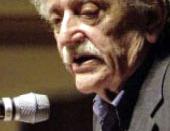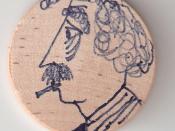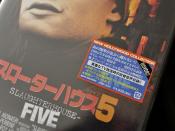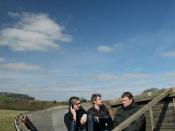Slaughterhouse Five, or The Children's Crusadeby Kurt Vonnegut-The Real War as a Children's Game-The satirical, cynical, skeptical and fantasist humor is the main characteristic of Kurt Vonnegut's work in a book that keeps being written and re-written hoping to make itself useful for the humanity... "Hey, as long as we are stuck with being Homo sapiens, why mess around? Anybody got an atomic bomb? Who doesn't have an atomic bomb?" But behind his cynical attitude hides a real humanist who fights against war through his books, a mature man who had so much to learn from his war experience that marked his youth experience in Dresden, firmly convinced that Homo sapiens's fight must be directed against the madness and nonsense of this world. This might be one of the main reasons he chooses to consider the war as an immature way of fighting, initialized and realized by childish leaders who make immature decisions, that happens to be sustained by immature soldiers who dream themselves important and dangerous in their vanity.
In his work, Vonnegut often refers to his autobiographical details, fictionalizing them relatively. He uses the voice of the narrator as an alter-ego in order to express feelings or to share his opinions, keeping certain modesty and admitting multiple perspectives, intertextuality, metatextuality and discussing also other's opinions in his work.
"I became a so-called science fiction writer when someone decreed that I was a science-fiction writer. I did not want to be classified as one, so I wondered in what way I'd offended that I would not get credit for being a serious writer."In A Man Without a Country I could find intertextual reference to Slaughterhouse Five. Actually he was planning to write a book about his war experience in Dresden, but he always desired to tell the truth and to give a very objective and realistic perspective of it. He tried to write it so many times, and actually he repeated writing about it in many of his books, looking for the best perspective, but it is only with time that he manages to clarify his point of view. The author explains from a different perspective what determined him to write this book and why he chooses this title and subtitle. It all begun when he went to a pal's house, Bernie O'Hare, trying to remember funny stuff about their prisoners period in Dresden. And the subtitle came out from the mouth of Mary O'Hare, his pal's wife, when she said: "You were nothing but babies then." And this affirmation wakes a new perspective in Vonnegut's mind. "And that is true of soldiers. They are in fact babies. They are not movie stars. They are not Duke Wayne. And realizing that was the key, I was finally free to tell the truth. We were children and the subtitle of Slaughterhouse Five became The Children's Crusade."It is very interesting how in Slaughterhouse Five Mary even accuses him of pretending a distortion of the truth: 'But you're not going to write it that way, are you.' This wasn't a question. It was an accusation. As the author was not decided yet about the tone of the future novel, Mary continued with her accusations, insisting that as real author in his vanity he will pretend to have been a man instead of foolish virgin right at the end of childhood. And it's unbelievable how the war experience still makes immature men dream that they will be played in glamorous movies by famous sexy actors incarning war-loving dirty old men. The woman's perspective becomes in this moment more realistic and accurate than a male perspective about war. For a woman it is easier to notice how war is partly encouraged by books and movies than for a man who might be tented to live a similar experience in his immaturity. And as he promised to her, the book about his war experience was never going to be finished and it was not going to show a romantically pro-war perspective.
The way literature and romance distortions history and reality is obvious also in the Children's Crusade example, volunteer children that thought they were going to Palestine and who were sold as slaves in North Africa or drowned in shipwrecks.
Vonnegut is aware of the fact that war stories have become fashionable and that one of the most impressive ways of telling your war story would be that of refusing to tell it. He admits that another reason for not talking about war is that it's unspeakable. That's why he keeps promising that he won't write another book, he keeps telling and re-telling his stories every time for a new perspective, because once he begun talking about his war experience he became conscious of how difficult it is to give the best perspective of it because the most important always remains unspeakable.
Under the alter-ego mask of Billy Pilgrim, Vonnegut writes about his survival experience in Slaughterhouse Five in Dresden, and also concentrates on other phases of his life. A novel with almost no characters, a normal consequence of the dehumanizing experience of war that discourages people from being characters. A story with almost no dramatic confrontation, as experience acquires the dimension of senseless survival rather than fight.
Having learned time travelling from the aliens, Billy Pilgrim develops his skills by using them in order to bounce around time to various portions of his life, choosing to return many times at the World War II period when he was captured, taken prisoner, and held in Slaughterhouse Five in Dresden. Fate is one of the major themes of the book, as the prayer of serenity appears twice in the book insisting on the idea that we need to change the things we can and be wise enough to know what are the things that we cannot change. The aliens also know about fate. They know that the Universe is going to have an End, and still they do nothing to stop this. Is Vonnegut trying to say that war is one of the things we cannot stop, or is he rather initiating an anti-war fight by his books?The book starts with the affirmation of truth: "All this happened, more or less." The war parts, anyway, contain psychologically true experiences. The unlikely hero, Billy Pilgrim, transcends time and space. The relaxing style of this black comedy interferes with the anti-hero characteristics of the protagonist, offering a humorous satirical version of a cruel reality that marked his existence. What Billy Pilgrim learns from the aliens is that we are actually timeless beings who are able to keep experiencing what we call past, present and future over and over again. Time is not perceived like a river any longer, but as omnipresent. Past cannot be changed, but he can go back or further beyond the limits of time. Billy transcends the limits of time, he travels back to his war experience, his marriage experience, etc. as if he would be naturally thinking and wondering about the meaning of his life. Fantasy and realism combine in his fictionalized memoirs, overtaking horror by some kind of fatalistic and in the same time humorous view of life.
The book is trying to make young people aware of the fact that violence and massacre is not what it seems to be. They should be aware that glory and massacre are vanities and fight with this barbarism by means of their maturity and awakening knowledge. Life and death are not definitive states but intermediary: When a Tralfamadorian sees a corpse, all he thinks is that the dead person is in a bad condition in that particular moment, but that the same person is just fine in plenty of other moments. Life and Death coexist but they are just temporary states of being.
Bibliography:Vonnegut, Kurt - Slaughterhouse Five: or The Children's Crusade, A Duty-dance with Death, Kindle Edition, 2002Vonnegut, Kurt - A Man Without a Country, Daniel Simon Editor, 2005






